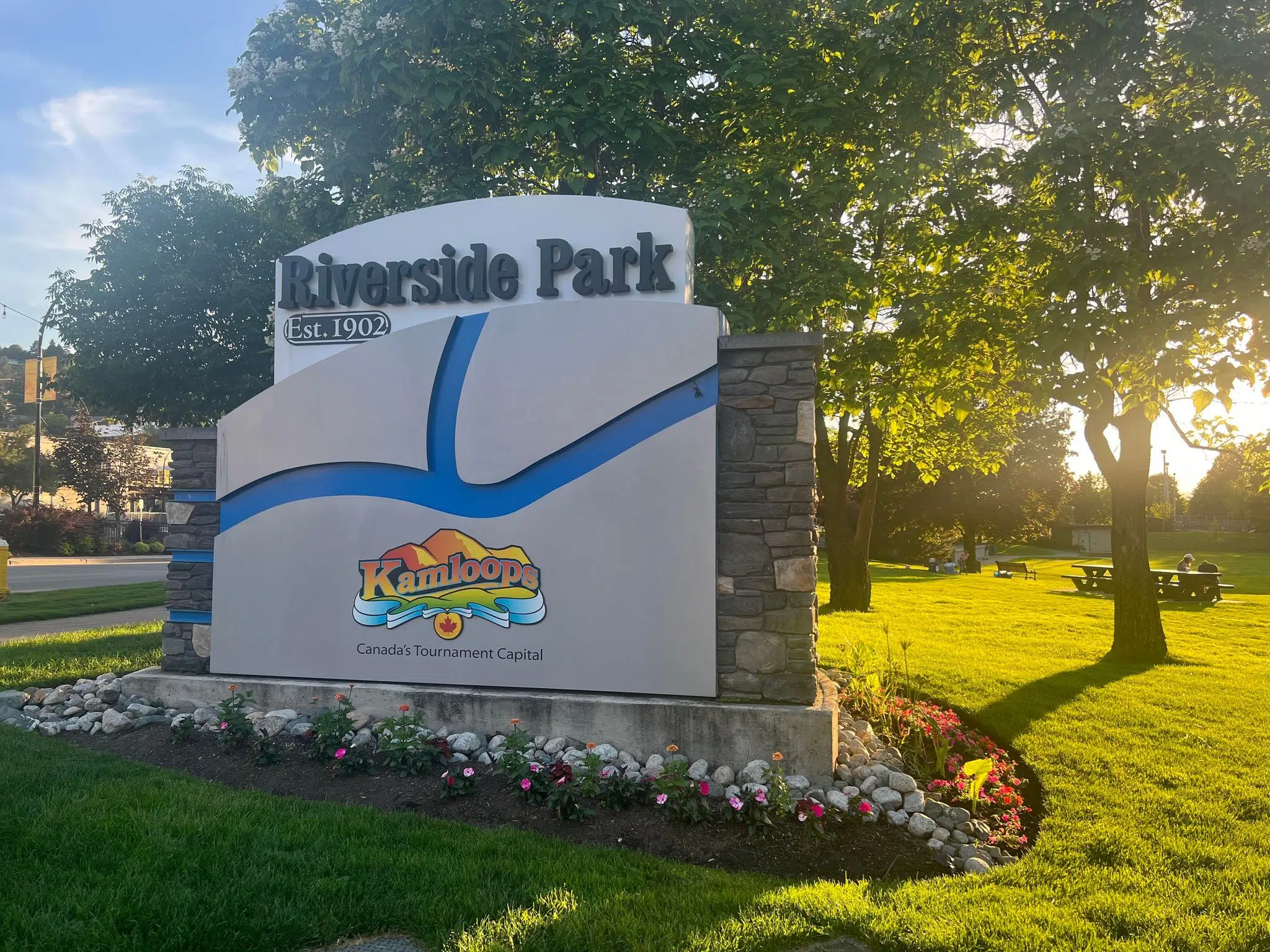
Riverside Park sign (Photo via Abby Zieverink)
Kamloops city council has voted to ban the use of illicit drugs in public parks and facilities.
The motion brought forward by councillor Katie Neustaeter was to amend an existing bylaw – Parks and Public Lands Bylaw No. 35-66, 1998 – that outlawed drinking and smoking in public parks and facilities to include the use of illicit drugs. Those drugs would include cocaine, heroin and MDMA, the possession of small amounts of which is decriminalized.
“The general thought is that by decriminalizing, people who use drugs will break down stigma that stops people from accessing life-saving supports and services. And that’s a very good thing. That’s a good move,” she said, noting her motion was a practical, common-sense move to try to maintain social order on city streets.
“But the gap that’s been identified at the local level is a strategy for effective implementation that considers the wider community, as this experimental measure does not address the societal expectation around where those substances can be used.”
Neustaeter said she has an “overwhelming amount of support” from residents voicing their support for the notice of motion, which was presented at the previous council meeting
“A lot of this is about setting the expectation and not so much about the enforcement side at this point, which we will continue to strategize about,” Neustaeter said.
Two councillors – Dale Bass and Nancy Bepple – voted against the motion Tuesday, citing concerns that these public spaces are the only places where the unhoused can use substances.
“We are not going to stop them from using, but we are going to be moving them from a public space to a private space,” Bepple said, noting the amendment could lead to more overdoses in public washrooms.
“It’s then going to be a private business’ problem to clean up the mess.”
“Yes we have the right to impose some limitations, but for somebody who is unhoused there is no other place but the public space,” Bepple added.
Bass also criticized the motion as “unenforceable,” and likened it to the bylaw that is meant to prevent vehicles from idling.
“It makes us look like, ‘Well, we’re doing things,’ but really not doing anything,” she said. “That bothers me, because we would just be setting ourselves up for more, ‘You’re not doing anything.'”
Voting in favour of the motion were councillors Neustater, Bill Sarai, Margot Middleton, Stephen Karpuk, and Mayor Reid Hamer-Jackson.
Councillor Mike O’Reilly was not present for Tuesday’s meeting, while Kelly Hall missed much of the council meeting. He was present virtually for a Committee of the Whole meeting Tuesday morning and the start of the council meeting before technical issues with the livestream prevented him for returning to the meeting.
“If I can’t go to Riverside Park and open a bottle of wine because its against the law, that the police will come and they’ll pour it out or they’ll take it away from me, that should be the same laws that they have to follow,” Sarai said.
“You’re legally allowed to carry it but I don’t see anywhere where you’re legally allowed to use it openly. We have just let them do it.”
Neustaeter’s motion didn’t lay out what enforcement would look like, though she called it a first step, with more work to come.
“11-per-cent of overdoses that are happening are outside. 11-per-cent. So this isn’t about pushing people into spaces where they can’t see,” Neustaeter said.
“I don’t think that it will ultimately change those numbers very substantially. You’re also talking about the end-game. We’re so far away from the end-game. This is a baby step in one direction.”
Sarai also confirmed to NL News that the proposed bylaw amendment will need another approval from council once the existing bylaw has been updated by staff to reflect Tuesday’s vote.
Once it passes three readings it will require sign off from B.C. Health Minister Adrian Dix as it affects public health policies before the city can formally adopt it.
“We also have to consult with Interior Health so we are a long way from the finish line,” Sarai said.
In discussing her plans with NL News last month, Neustaeter said she fully anticipated that her plan, if successful, could be a legal test for decriminalization.
– with files from Brett Mineer
















